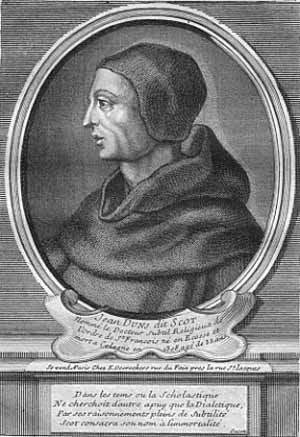Is Discussion of the Absolute Primacy of Christ Passé?

Shortly after the Academy of the Immaculate published my primer on the Primacy and AirMaria.com produced my series The Cornerstone there was a bit of a resurgence in the blogosphere and in written publications about the rarely discussed discussion of Bl. John Duns Scotus’ doctrine and the Franciscan thesis regarding the absolute primacy of Christ and the opposing position of St. Thomas Aquinas. This, from my perspective, confirms that the discussion is anything but outdated; rather it is fresh and invigorating – and this because it is the doctrine which puts Christ at the center of the universe and of our own personal lives regardless of sin. Jesus redeems us from sin; but He is not just a remedy for our sinfulness. Rather He is the Alpha and Omega for whom, from whom and in whom all things exist.
What about the discussions (sometimes very heated!)… Here are some samples from the Orthodox/Catholic blogosphere:
- Ad Orientem (an Eastern Orthodox website): The Motive of the Incarnation
- Disputations: We could do it the easy way or the hard way (scroll down to March 24th)
- Disputations: It’s not the truth/Ain’t actual/Everything is counterfactual (scroll down to April 12-13)
-
Irish, Catholic & Dangerous: Franciscan (Scotistic) Thesis: Absolute Primacy Of Christ
- Musings of a Pertinacious Papist: Cur Deus Homo?
- Faith Magazine: The Primacy of Christ in John Duns Scotus
- Canturbury Tales: Would Christ Have Become Man If Man Had Not Sinned?
- Catholic Answers: To All Christians – What if Adam had not eaten the fruit? Would Jesus exist?
Perhaps the most surprising discussions, however, were those in the Protestant blogosphere. In 2008 Philip Yancey presented, in a popular style, a piece called “Would Christmas have come even if we had not sinned?” While it is clear that Yancey had not read Scotus himself (i.e. Scotus alludes to Scripture, but never cites any passage in presenting this doctrine; moreover, it is the Franciscan school – not Scotus – that will dub it the “doctrine of the absolute primacy of Christ the King,” whereas Scotus just presents the principle arguments: Christ’s predestination and God’s orderly willing), nonetheless, Yancey did grasp, present and encourage discussion on the subject. Here is a sampling of what ensued (please keep in mind that I may not be fully in accord with the presentations/discussions listed, but simply want to show that the discussion is alive and well):
- Christianity Today’s original article
- This side of Sunday: Is there Christmas without a fall?
- Random Musings from a Doctor’s Chair
- Stand Firm: Faith among the Ruins
- Charlie Taylor Ministries: The Original Dunce
- The Surprising God: Was the Incarnation an afterthought?
- Theological theology: Why God became Man
- Free Republic: Primacy of Jesus Christ, Alpha & Omega
Besides all of the blogosphere discussion, a number of books and articles have been popping up on the subject. Here are three examples from Protestant circles:
- Incarnation Anyway: Arguments from Supralapsarian Christology – by Edwin Christian Van Driel
- On Getting First Things First: Assessing Claims for the Primacy of Christ – by Myk Habets
- The Fire of the Word – by Chris Webb
Obviously this is just a smattering of examples; but they should suffice to show how important the subject continues to be in theology and even at a popular level. After all, Christ is the King of kings and we can never reflect enough about His primacy in our own lives and in the entire universe which God created for Him, in Him and through Him, as the Bible so clearly tells us.
Let us continue to reflect on the importance of this truth in our own lives and in the world around us. Where Christ reigns as King, there is peace!
In Corde Matris,
fr maximilian mary dean, F.I.
